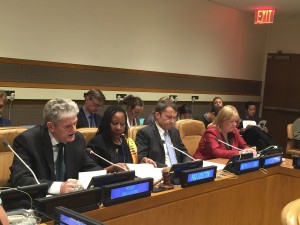Opening remarks by Mr. Mogens Lykketoft, President of the 70th session of the General Assembly, at World Food Day 2015 “Social Protection and Agriculture: Breaking the Cycle of Rural Poverty”
16 October
Excellencies, colleagues, ladies and gentlemen, it is a great pleasure to celebrate World Food Day with you, only three weeks after world leaders adopted the 2030 Agenda for Sustainable Development.
This revolutionary Agenda marks the beginning of a new era for global cooperation aimed at eradicating poverty and hunger, and creating a world of shared prosperity, peace and sustainability.
The theme of this year’s World Food Day “Social Protection and Agriculture: Breaking the Cycle of Rural Poverty” resonates very well with the new Agenda, which demands a greater focus on vulnerability and on an integrated approach – integration not just across the three dimensions of sustainable development, but also across each of the Sustainable Development Goals.
Indeed, the collective work of FAO, IFAD, WFP and ILO in organising this event, is as an example of the type of cross sectoral cooperation needed to advance the new Agenda.
Today’s focus on poverty and hunger in rural areas is also especially appropriate, for despite progress during the MDG years, more than 75 percent of the extreme poor and chronically undernourished in developing countries continue to live in rural areas today. And despite economic diversification in some countries, most of these people continue to depend on agricultural production for their subsistence.
It is therefore imperative that we strengthen, for example, policy instruments for social protection, food security and modern agriculture development. Access to social protection can be particularly crucial when it supports the most vulnerable including the elderly or persons with disabilities. Helping small farmers to improve farm productivity and increasing non-farm job opportunities, can help grow family incomes. Financial inclusion, particularly for women, can empower otherwise marginalized people. And better access to health and education programmes can significantly reduce malnutrition and enhance capabilities.
Overall, we need a comprehensive approach to rural development and we need political will and leadership at all levels as well as engagement of key stakeholders such as the private sector and civil society. The Secretary General’s Zero Hunger initiative is an example a movement which can bring together these different aspects and can be a major driver of progress over the next fifteen years.
Ladies and gentlemen, during this 70th session, I am committed to ensuring that such leadership and a multi-stakeholder approach flourish around the SDGs, so that implementation gets off to the best possible start.
In a month’s time, therefore, and given the Agenda’s commitment to leaving no one behind, I will convene a General Assembly meeting on the global refugee crisis. In the new year, I will encourage member states to consider how best to maximise the global follow-up and review process. And in April, I will convene a high level thematic debate on the implementation of SDGs where I will engage a wide group of stakeholders so as to foster partnerships and initiative to help us move from commitments to action.
I count on your active engagement and I look forward to a dynamic and a fruitful discussion here today.
Thank you.


